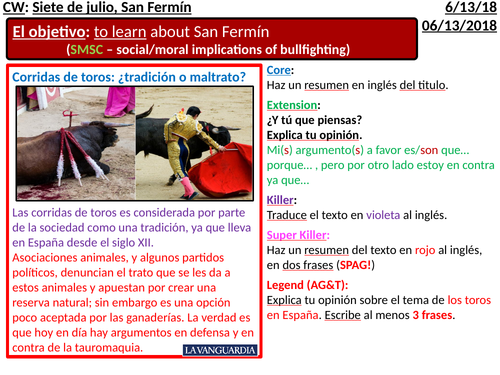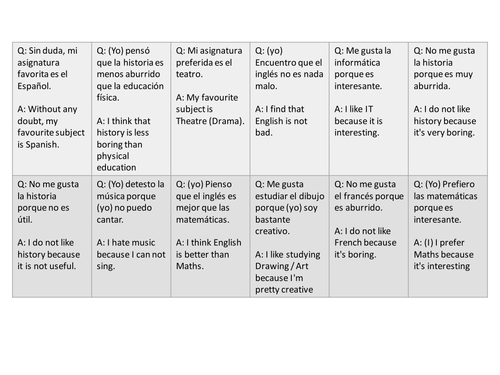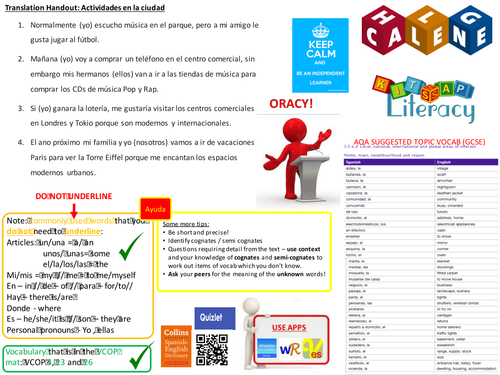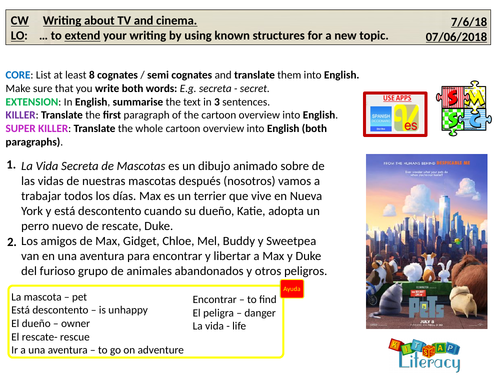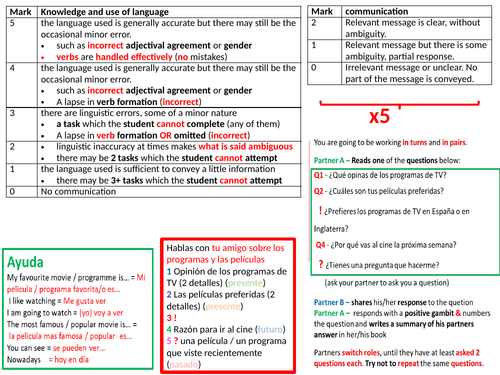
121Uploads
35k+Views
5k+Downloads
World languages

GCSE Spanish- 6 Starters -Cultural/SMSC (differentiated -5 levels)-Speaking, Reading, Writing skills
This a set of Starters with answers that could be used either for the lessons from the topic of festivals and celebrations or as a stand out SMSC - Cultural starter. I included answers so that children can check their answers. These are mostly for higher y8 or for KS4 lessons, differentiated (CORE, EXTENSION, KILLER, SUPERKILLER, LEGEND). All of the instructions are in Spanish.
They can also serve as a template to create your own tasks - just change the text and (slightly) the questions.
First Starter is on the topic of San Fermin and includes an authentic text from the ‘La Vanguardia’, an on line newspaper. The examination focus of this starter is Reading. Second Starter features similar tasks but a different text, also authentic.
The third one is on the topic of La Tomatina and is essentially a Role-play task with success criteria. It therefore focuses on Speaking.
The fourth one is a Photo card Starter on the topic of Aste Nagusia (or festivals in general) with help and instructions and therefore can be used as a Speaking / Writing activity. Fourth one follows the same idea but is designed for the topic of holidays.
The fifth is a grammar starter for any holidays topic and its focus is the Past Simple (preterite) and the Future SImple (‘will’). We use Viva books so I included help boxes as a reminder for those who do not clearly remember the endings.
The sixth starter focuses on Reading (parts B and C). Students translate and analyse the adjectives in the Wordle.
Let me know what you think!

Opinions on studies - Spanish- AQA (new spec) GCSE Reading (Section A) practice
This is a lesson on opinions ad subjects for a GCSE Spanish class. The lesson includes a literacy (scramble style) starter, a Mini-test on present tense verbs conjugation ( I often give these ones), a quizlet on the words that would be used in the reading task, and a reading task itself. I am trying to teach them how to approach these tasks in the most effective way so they underline the words they know and find out the ones they do not. I wrote the text myself on the basis of the one from the specimen materials for it to have a similar structure to the one they will see in the exam. Finally they self-assess their work (and learn new words!). I also attach a quiz quiz trade that I have prepared for the end of the lesson to revise the previously learned grammar and vocabulary.

2 versions of AQA GCSE (new from 2016) : Activities in town - Exam practice (Reading, Section C)
This is the lesson for my GSCE Spanish class about activities in town. It includes a range of activities to satisfy the school policies, such as Independent Learning, Kagan, differentiation and engagement. I have included a short test to check vocabulary and a quizlet to learn some new words that they would use when completing the Reading activity (AQA new specification Reading Section C). I was trying to teach them how to approach text reading and translation. I also include a handout that I have prepared as an additional help. Please note that VCOP mat refers to reasons, opinions and the tenses.
I attach two versions of the same lesson as one I used with older pupils and another one was amended for the observation (I got 1c/2a feedback!)

A typical school day - Spanish- AQA (new spec) GCSE Reading (Section B)
This is a lesson is about a typical school day for a GCSE Spanish class. The lesson includes a literacy (scramble style) starter, a tongue twister activity (to practise pronunciation of the 'go' sound), a pronunciation activity and a quizlet on the words that would be used in the reading task, a rally couach mini-plenary (it goes after I first show them the text so they realise they would really need to remember the words) and a reading task itself. I am trying to teach them how to approach these tasks in the most effective way so they underline the words they know and find out the ones they do not. I wrote the text myself on the basis of the one from the specimen materials for it to have a similar structure to the one they will see in the exam. I have also included a slide on how to use VES application to find and to correctly translate a verb which is not written in infinitive and a mini-plenary for them to practise using the same. You can introduce some competition in here if you wish. Finally they self-assess their work and compete to translate / provide a definition of the words in the plenary task that they have learned in previous lessons.

Writing: TV and cinema (opinions) - Spanish - AQA KS3/KS4 GCSE (Speaking / Writing)
This is a lesson on TV shows for an early GCSE Spanish class which can be used with a higher year 8 students.
The lesson starter is a differentiated reading / writing / grammar task based on the review of a famous cartoon - Secret Life of Pets. Students read the overview of the cartoon and complete the tasks. Then they check the answers followed by phonics practice (resiting tongue twister!). Then I included a mini-test to recap / check whether students remember how to conjugate ‘tener’ in present tense. Consequently they play the Speaking Cube - 6 sides of the cube are completed with the topic questions for the half-term. Students roll a cube (you can either ask them to glue them together or you can make them yourself). I figured 6 cubes per year for each year group is an easy enough task to continue repeating the questions of all half-terms for the whole school year. The template is in the end of the lesson in case you need to change the questions (colours correspond to the difficulty of the question (core- blue, extension is green, violet is killer and pink is super killer).
Then they get to revise verb 1 + verb 2 structure and complete a writing task. Before writing I tried to give them some ideas by showing them the Spanish trailer of the cartoon mentioned in the starter activity (they loved it!). The trailer is from Youtube. Finally they self/peer -assess their work by way of analising the success criteria and play a vocabulary game as a reward. The younger students might be allowed to use a dictionary or to think of any word. In any case, feel free to change the rules!
Please let me know if there are any problems / ideas! Enjoy!

Role-play: opinions on TV / movies - Spanish - AQA KS3/KS4 GCSE (Role-play)
This is a lesson on TV shows for an early GCSE Spanish class which can be used with a higher year 8 students.
The lesson starter is a recap on some simple concepts (articles / gender / adjectival agreement/ spelling) to wake the students up followed by phonics practice (resiting tongue twister!). Then I included a mini-test to recap / check whether students remember topic-related vocabulary.
Then they get to revise topic words via online quizlet activity. Students are to choose what quizlet task they want to do based on their level therefore this engaging task is differentiated. Then I have included a game - Roll-A-Word - Students roll a dice to complete different tasks related to the new and / or familiar words (both learning and revising). They count the value of the completed dices to make the task more competitive. Then they revise question words and how to form different types of questions in Spanish. They then jot their thoughts on a Role Play task in pairs (using grammar help - note: we use VCOP mat so if you have one you will need to change the numbers of the grammar points, if not you need to delete few bits, the examples of structures are provided anyway) and complete in in writing individually . Then their ‘Time Pair Share’ the Role Play and self/peer -assess their work by way of analising the success criteria (you might want to show it prior to the task for the novices).
Please let me know if there are any problems / ideas! Enjoy!

